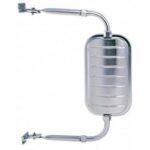The world of selling used car parts can be a lucrative venture, especially with online platforms like eBay connecting buyers and sellers globally. However, recent communications from eBay regarding environmental regulations have introduced confusion and concern, particularly for businesses engaged in selling used auto parts. This article aims to clarify these regulations and provide guidance for businesses navigating this evolving landscape.
Recently, many sellers on eBay, especially those dealing with automotive components, received an email raising concerns about Environmental Permitting Regulations. This communication highlighted that both businesses and private sellers listing used vehicle parts must adhere to specific rules. The core of the issue revolves around whether sellers are dismantling vehicles themselves or sourcing parts from elsewhere. According to eBay’s interpretation of these regulations, if you dismantle vehicles, you absolutely need a permit, and this permit number should be clearly displayed in your item descriptions. Failure to do so is considered operating illegally. Furthermore, even if you aren’t dismantling vehicles personally, eBay states that your parts must originate from a “verified source” that possesses a permit to “depollute and dismantle end of life vehicles.” This directive has left many in the used car parts business questioning the implications for their operations.
This email from eBay has stirred considerable debate and confusion within the automotive community. Many, like the original poster in a popular online forum, are questioning whether these rules apply to them, especially if they are not involved in dismantling entire vehicles. For example, a business that buys and repairs used ECUs or speedometers – essentially giving these parts a second life – might be unsure if they fall under these stringent regulations. The ambiguity extends to private sellers as well. Consider an individual who upgrades their car and wishes to sell the perfectly functional original parts. Are they also bound by these complex permitting rules?
The crux of the confusion lies in the interpretation of “dismantling vehicles” and “end of life vehicles.” Are these regulations primarily targeting large-scale vehicle dismantling operations to ensure environmentally sound disposal of hazardous materials? Or do they extend to anyone selling any used car part, regardless of its source or condition? The regulations are undoubtedly in place to ensure that the dismantling of vehicles is done responsibly, preventing environmental damage from improper disposal of fluids and hazardous materials. However, the broad wording in eBay’s communication raises concerns that it might be overreaching, impacting legitimate small businesses that are contributing to the reuse and recycling of valuable automotive components.
For businesses selling used car parts, especially online, understanding and adapting to these regulations is crucial. While eBay’s enforcement approach can sometimes appear rigid, ignoring these communications is not advisable. Businesses should first carefully assess their operations. Are you dismantling vehicles yourself? If yes, obtaining the necessary permits and displaying the permit number is non-negotiable for continued operation on platforms like eBay. If, however, your business model involves sourcing used parts from individuals or other businesses (who are not end-of-life vehicle dismantlers), the situation becomes less clear.
In such cases, open communication with eBay might be the most pragmatic approach. Clearly explaining your business model – emphasizing that you are not dismantling vehicles and are involved in repairing and reselling functional used parts – could provide clarity. Documenting your sourcing process and ensuring you are compliant with general product safety and consumer regulations can also strengthen your position. Furthermore, exploring alternative online platforms or even offline sales channels might be a prudent strategy to diversify your business and reduce reliance on a single platform with potentially ambiguous regulatory interpretations.
In conclusion, while the intent behind environmental regulations is undoubtedly positive, their application to the used car parts business, particularly in the context of online sales, requires careful consideration and clearer communication. Businesses selling old car parts need to proactively understand these rules, assess their compliance, and engage with platforms like eBay to ensure continued operation within the defined legal and platform-specific boundaries. As the situation evolves, staying informed and adaptable will be key to success in the business of selling used car parts.
